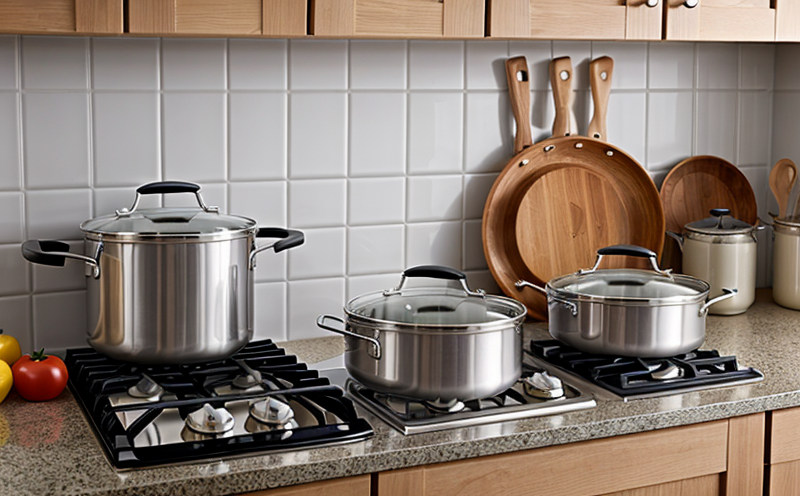Abrasion Resistance Testing in Non-Stick Cookware
Non-stick cookware has revolutionized kitchenware by providing easy cleaning and non-reactive surfaces, making it a popular choice among consumers. However, the durability of these coatings can be compromised over time due to abrasion from cooking utensils or harsh detergents. To ensure that this crucial feature meets consumer expectations, abrasion resistance testing is essential.
Abrasion resistance testing evaluates how well the non-stick coating withstands mechanical wear and tear during use. This test is critical for quality assurance as it helps manufacturers identify potential weaknesses in their product design early on, thereby improving overall reliability. The test simulates real-world conditions to assess whether the cooking utensil will maintain its integrity throughout its lifecycle.
The process involves subjecting a sample of non-stick cookware to controlled abrasive wear using various standards such as ISO 15228-3:2016 or ASTM D4303. During this test, the sample is exposed to repeated rubbing motions with an abrasive material under specified conditions, including load, speed, and duration.
Once testing is complete, the extent of damage to the coating is visually inspected and quantified. Various metrics may be used to assess performance, such as weight loss or thickness reduction at the site of abrasion. These measurements provide valuable insights into the long-term durability of non-stick surfaces, which can inform improvements in future iterations of products.
By incorporating this testing process into their development and manufacturing processes, manufacturers can ensure that they meet stringent industry standards and consumer demands for high-quality kitchenware. This not only enhances brand reputation but also fosters customer trust by delivering reliable and durable products. Furthermore, successful abrasion resistance testing can help companies avoid costly recalls and warranty claims related to product failures.
- Customer Impact and Satisfaction: Ensuring that non-stick cookware maintains its performance over time is crucial for customer satisfaction. Consumers expect their kitchenware to last for years without significant deterioration, especially when it comes to essential items like frying pans or saucepans. By conducting thorough abrasion resistance tests, manufacturers can meet these expectations and build stronger relationships with customers.
Quality and Reliability Assurance
In today’s competitive market, maintaining consistent quality is paramount for any business. For non-stick cookware manufacturers, this means ensuring that each product meets rigorous standards not just in terms of initial performance but also longevity. Quality assurance (QA) plays a vital role in achieving these goals by incorporating various testing methods into the production process.
Abrasion resistance testing is one component within QA frameworks aimed at detecting potential issues early in the development cycle. By identifying problems before they reach end consumers, manufacturers can implement corrective actions promptly, reducing waste and improving efficiency. Additionally, robust QA practices contribute to building a positive brand image through consistent delivery of reliable products.
The importance of reliability cannot be overstated when it comes to kitchenware, where functionality is key. Consumers rely heavily on their cookware for daily tasks; therefore, any compromise in durability could lead to dissatisfaction or even abandonment of the product altogether. Therefore, investing in thorough QA processes like abrasion resistance testing ensures that every item leaves the factory floor ready to perform optimally under realistic conditions.
Adherence to recognized international standards such as ISO 15228-3:2016 or ASTM D4303 further strengthens confidence among both internal teams and external stakeholders regarding product quality. These guidelines provide clear criteria against which results can be evaluated, ensuring consistency across different batches of production.
Overall, integrating abrasion resistance testing into the broader QA strategy helps manufacturers maintain a high standard of excellence in their products while fostering trust with customers who value long-lasting solutions for their households.





